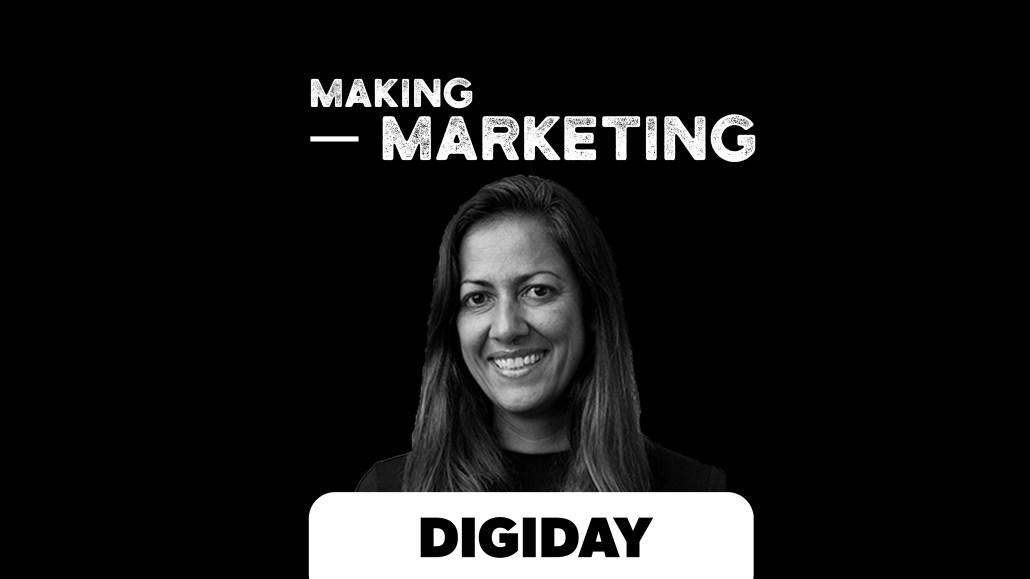Secure your place at the Digiday Media Buying Summit in Nashville, March 2-4
Athleta CMO Sheila Shekar Pollak: Moving creative in-house was not out of frustration with agencies

Subscribe: iTunes | Google Play | Stitcher | RSS | Anchor
In the last year, Athleta, the women’s workout wear brand owned by Gap Inc., has taken its creative in-house for its content creation efforts.
“We spend a lot of effort, resources and time on video and video storytelling, which is a capability we have built over the years,” said Sheila Shekar Pollak, CMO at Athleta, on this week’s Making Marketing podcast. “We’ve done a lot of it internally, especially in the last year. We used to work more with a creative agency. [But] we realized that we’re closest to the brand and we know and feel [our] mission than anyone. It’s not that I don’t value the external perspective an agency can bring. We had a wonderful relationship with our agency. So it wasn’t a frustration. It was just more about empowering the internal creative teams. We see it as a mini-agency within the team. We had great success. We turned out our January contender campaign in a couple of weeks, which was so fast, and it used to take us months.”
Pollak discusses the marketing mix for the brand that is on its way to becoming a $1 billion business, the importance of in-store events, omnichannel marketing and more. Edited highlights below.
The new experiences are suited to in-store and online interactions with the brand.
“The Wellness Collective is a one-stop experience for our customers to experience holistic wellness with Well+ Good. It’s going to come to life in our stores in the U.S. and we’re also going to capture this content, in forms of photography, videos and interviews and push it through our digital vehicles. We’ll do some of these interviews in our catalog, where we can tell more long-form stories. We’ll have more animated content that will go on our social media channels, website and Well+Good’s website. You’re going to be exposed to four different pillars of wellness: mind and body, finance and career, self-care and community, that includes sustainability and giving back.”
The future of retail is in the physical space.
“We want more events for [the customer] to participate in. We also want great partnerships of national but also local significance. It’s a highly integral part of our marketing mix. It’s not an add-on. This is foundational to how we want to interact with our customer. From a metrics perspective, it’s about a deeper engagement with our customer and new customer acquisition. It brings new customers to the brand and discover us in a different way.”
The marketing channels go beyond just the ones that provide clear metrics.
“We have a lot of customer goals that we measure in terms of total active customer files, new customer acquisition and retention goals. As long as we’re hitting the aggressive customer goals, it’s a success for us. We measure it at a vehicle level but some of them are harder to measure than others. Community efforts are harder to pinpoint to one thing. We take smart risks. We double down on things we can measure extremely well and highly analytically. Then you take some risks in exploring new things, like doubling down on experiential community type things. We have seen best practice examples where you see trends. We’ve tested this over the years and now we’re seeing payoffs. It’s about smoothening that out across the fleet.”
The new customers will demand brand purpose.
“There’s a very complex political and social environment out there right now. People are now cynical and looking to businesses to be a force for good and to make the change socially and environmentally. At a recent conference, we were talking about brand purpose and to a much younger generation and [an attendee] said the generation reads everything skeptically and they’re looking for brands that have an authentic, deep and consistent purpose. They can ferret it out if it’s not done well.”
More in Marketing

Future of Marketing Briefing: AI’s branding problem is why marketers keep it off the label
The reputational downside is clearer than the branding upside, which makes discretion the safer strategy.

While holdcos build ‘death stars of content,’ indie creative agencies take alternative routes
Indie agencies and the holding company sector were once bound together. The Super Bowl and WPP’s latest remodeling plans show they’re heading in different directions.

How Boll & Branch leverages AI for operational and creative tasks
Boll & Branch first and foremost uses AI to manage workflows across teams.








